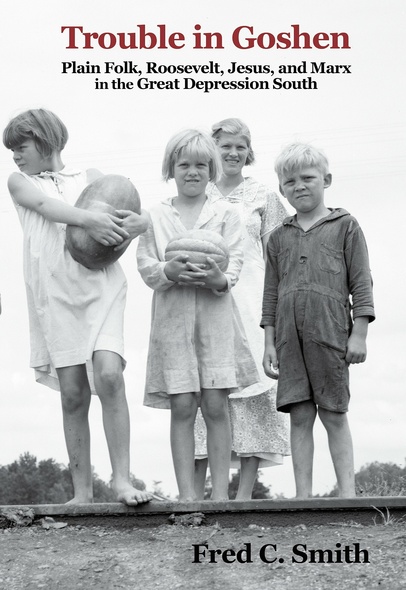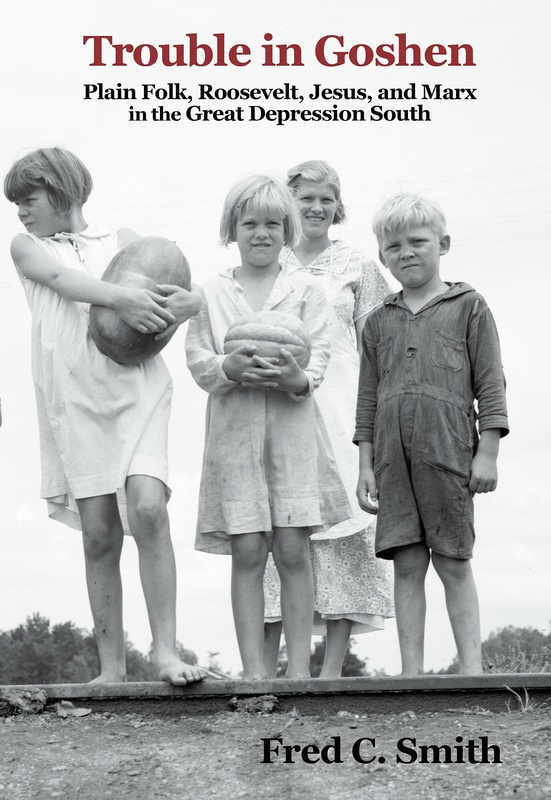
Trouble in Goshen
Plain Folk, Roosevelt, Jesus, and Marx in the Great Depression South
The Great Depression emboldened Americans to tolerate radical experimentation in search of solutions to seemingly overwhelming economic problems. Amongst the thorniest of those was rural southern poverty. In Trouble in Goshen, Fred C. Smith focuses on three communities designed and implemented to meet that challenge. This book examines the economic and social theories--and their histories--that resulted in the creation and operation of the most aggressive and radical experiments in the United States.
Trouble in Goshen chronicles three communitarian experiments, both the administrative details and the struggles and reactions of the clients. Smith covers the Tupelo Homesteads in Mississippi, the Dyess Colony in Arkansas, and the Delta Cooperative Farm, also in Mississippi. The Tupelo Homesteads were created under the aegis of the tiny Division of Subsistence Homesteads, a short-lived, "first New Deal" agency. Dyess Colony was the largest of the Resettlement Administration's efforts to transform failed farmers into Jeffersonian yeoman farmers. The third community, the Delta Cooperative Farm, a product of the active cooperation between the Socialist Party of America and a cadre of liberal churchmen led by Reinhold Niebuhr, attempted to meld the pieties, passions, propaganda, and theories of Jesus and Marx.
The equipment, facilities, and management styles of the projects reveal a clearly delineated class order among the poor. Trouble in Goshen demonstrates the class conscious angst that enveloped three distinct levels of poverty and the struggles of plain folk to preserve their tenuous status and avoid overt peasantry.
This is the most intimate and intricate study available of the visionary economic experiments that Americans undertook in the rural South during the Great Depression. Three careful case studies open up a vast range of theory and practice. The New Deal spawned two of the three; Christian socialists tried to move to the left of the New Deal in launching the third. With great learning and often sparkling wit, Fred Smith places these experiments in the long-term historical context of agricultural reform in American ideology and society. He sifts through the voluminous data of how the most ambitious and thoughtful plans for economic recovery worked out on the ground in the 1930s. He painstakingly narrates the often gripping story of why those plans failed: poverty and desperation did not extinguish the striving of ordinary Americans for individual freedom in their day-to-day working lives. Economic crisis did not cure the catastrophic arrogance of the privileged classes, even when they had benevolent motives and the best educations money could buy. It is a story full of thought-provoking surprises. Smith avoids both nostalgia and the condescension of hindsight in his unflinchingly non-partisan investigation of the human dimensions of America's greatest economic failure. While granting the justifiably popular successes of New Deal programs and their often tragically disappointing limitations and undeniable waste, he challenges the blithe blindness that unites left, right, and middle to this day in their faith that their ideas will be able to get modern capitalism out of the trouble it keeps getting into. If you want ammunition to advance your side's brilliant solutions, don't read this book. If you are willing to learn that we all need to go back to the drawing board, and start with a little humility, you may be ready for the tough truths this book has to teach.'
--David L. Chappell, author of A Stone of Hope: Prophetic Religion and the Death of Jim Crow and Waking from the Dream: The Struggle for Civil Rights in the Shadow of Martin Luther King, Jr.
This is history with a purpose: to learn from the efforts of federal government and Christian and social reformers, who established agricultural and biracial cooperative communities in Mississippi and Arkansas in the mid-1930s. Grounded in intensive research and informed by broad historiographical familiarity, the book is clear in its conclusion: the effort to shape and limit the aspirations of community members and would-be members undercut the good intentions of the New Deal reformers; future efforts must keep this in mind. The judgment is driven home in rich prose and anecdotes.'
--David Moltke-Hansen, past president of the Historical Society of Pennsylvania and past director of the Southern Historical Collection and the Center for the Study of the American South




